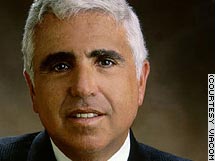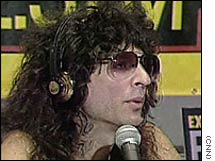NEW YORK (CNN/Money) -
Mel Karmazin is leaving Viacom Inc., and Sumner Redstone, the boss he fought with, has given a deadline for his departure as well.
 |
|
| Viacom President and Chief Operating Officer Mel Karmazin is leaving the company. |
Karmazin, who signed a three-year contract extension as president and chief operating officer a year ago, ended a sometimes stormy tenure at the company he joined during the 2000 merger of Viacom and CBS Corp.
Karmazin does not have a non-compete clause to stop him from joining other media conglomerates. Dissident Disney shareholders wasted no time Tuesday calling on the Disney board to look at him for the CEO spot there. But Redstone and some analysts said they doubted Karmazin would land at Disney or another competitor.
Redstone, the company's chairman and CEO and the largest shareholder of the media conglomerate behind CBS, MTV and Paramount Pictures, announced Tuesday he would relinquish his role as CEO within three years.
Karmazin's departure helped send Viacom (VIA.B: down $0.39 to $36.50, Research, Estimates) Class B shares down about 3 percent in early trading, but the stock soon rebounded. It was off about 1 percent in mid-afternoon New York trading.
"We view this announcement as a very significant negative for Viacom as this represents the loss of an extremely talented operating executive," wrote Merrill Lynch analyst Jessica Reif Cohen in a note to clients Tuesday. But she maintained a "buy" rating, saying the company's shares are attractively valued and strong operating fundamentals had not changed with Karmazin's departure.
Tuesday's move could also be the beginning of the end of shock jock Howard Stern's stormy tenure with Viacom unit Infinity Broadcasting. Karmazin has been a strong defender of Stern's show in the face of criticism and steep indecency fines from the Federal Communications Commission.
Stern said on his radio show he believes he will soon be following Karmazin out the door.
"I know our days are numbered here on the air, but now they're really numbered," he told listeners. "They (Viacom management) will cave (to FCC pressure)... Between the FCC and Mel leaving the company, I've got to be on shaky ground now."
Competition for CEO spot
Tuesday's moves may do little to end management tension at the company. In fact, they set up competition to succeed Redstone between two of its top executives -- Leslie Moonves, the chairman and CEO of Viacom's CBS unit, and Tom Freston, the chairman and CEO of Viacom's MTV Cable Networks.
 |
|
| Shock jock Howard Stern says his days with Viacom are numbered with Karmazin's departure. |
Those two were named as co-presidents and co-chief operating officers. Redstone said he expects the board to name one of them as his successor sometime before 2007. He also denied that his daughter, Shari Redstone, 50, a Viacom director, would be a candidate for CEO
Both units have been very successful under Moonves and Freston. MTV and Viacom's other cable stations, including Comedy Central and Nickelodeon, are among the most profitable cable networks, and CBS has become the most watched broadcast network under Moonves, with hits ranging from reality show "Survivor" to crime drama "CSI."
Redstone told investors in a conference call Tuesday that neither he nor any other executives had asked Karmazin to leave. He attributed Karmazin's departure to frustration over the company's relatively low share price and the financial outlook for the radio business. Redstone repeated an earlier statement he made to a reporter that his relationship with Karmazin was at an all-time high.
Still contentious contract negotiations got played out in media reports a year ago. At that time, Karmazin got a contract extension through 2006, but the deal took back some powers granted to him at the time of the Viacom purchase of CBS, which he headed at the time, in May 2000.
Two years' pay for Karmazin?
Redstone would not give details about the terms of Karmazin's exit package, except to say it was "consistent with his contract and consistent with a great executive leaving our company having made a great contribution to our company."
| Related stories
|

|
|
|
|
The contract allowed for Karmazin to receive two years of "salary, target bonus, deferred compensation and certain benefits," if he left for "good reason." But the "good reasons" defined in the company's proxy report include issues such as being overruled by the board or not being named CEO immediately upon Redstone giving up the title.
Karmazin received $27.9 million in pay, bonus and deferred compensation in 2003, and his departure package is likely less than twice that amount. His 2003 bonus was $15 million, while the target bonus spelled out in the proxy was only $6.7 million. The target bonus was due to go up by at least 10 percent in each year of the contract.
Age is a factor
Redstone has repeatedly said he intended to stay on and lead the company, but David Mantel, media analyst with Loop Capital Markets, said age was an issue the board could not continue to ignore.
Mantel said splitting the company's No. 2 job between two executives who have been successful running profitable units was a way of keeping both with the company and reassuring Wall Street, cushioning the blow of losing Karmazin.
But he said having the No. 2 job split while saying the CEO job will be open within three years is not the best formula for promoting cooperation within the company.
Click here for a look at media and entertainment stocks
"For the moment that appears reasonable," said Mantel. "Does it present issues for the succession of Redstone, in terms of competitive jockeying? Sure."

|

